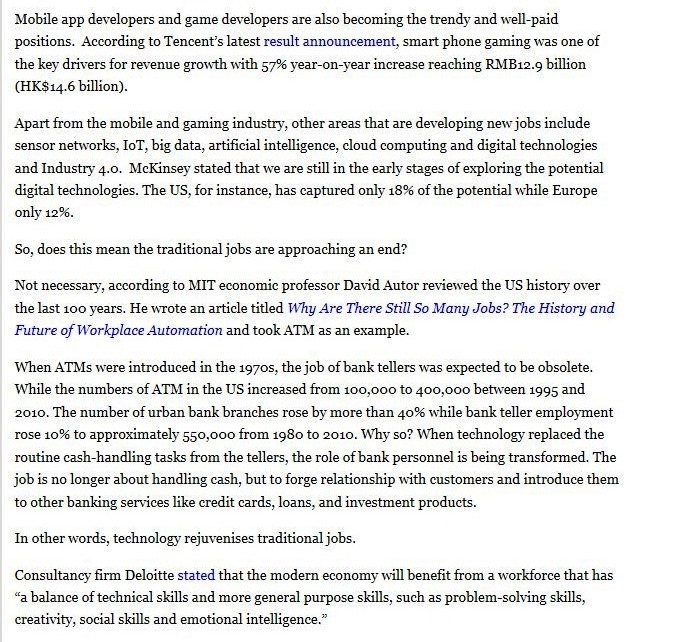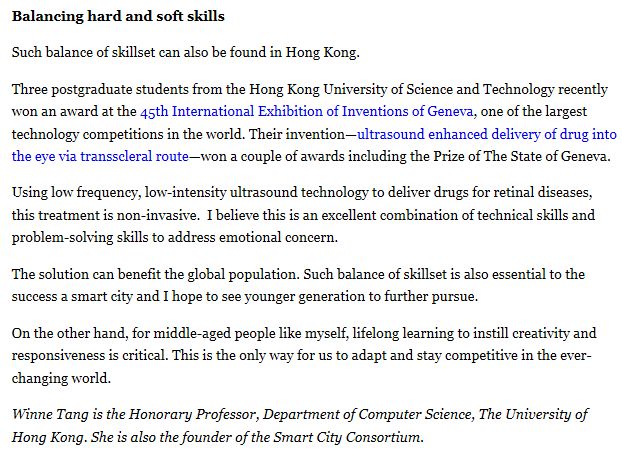網上版請按此



Jobs of the future has arrived
When did you last check your smart phone? According to the Internet Trends 2013 study from Kleiner Perkins Caufield & Byers, users check their mobile devices up to 150 times every day. That means 10 times an hour, this is unimaginable 10 years ago.
So many things become unimaginable these days. When we are worrying about our jobs being replaced by technologies, new positions are created from new emerging industries that most of us could not imagine, creating new ways to generate income.
According to a study by consulting firm McKinsey, positions in IT development, hardware manufacturing, mobile application creation, and IT systems management contributed one third of newly created positions in the United States in the past 25 years. Another study in 2011stated that in the previous 15 years, 500,000 jobs were destroyed by the Internet, but it also created 1.2 million new jobs during the period. In short, for every single job being destroyed, 2.4 new jobs were created.
Emerging jobs in HK
With Facebook becoming a daily necessity of about 5.1 million people here in Hong Kong and almost 1.3 billion people worldwide, it is not surprising to see a job opening from the Hong Kong Observatory (HKO) hiring a social media executive with monthly salary at more than HK$37,000. Some even praised HKO for being realistic and down to earth.
Mobile app developers and game developers are also becoming the trendy and well-paid positions. According to Tencent's latest result announcement, smart phone gaming was one of the key drivers for revenue growth with 57% year-on-year increase reaching RMB12.9 billion (HK$14.6 billion).
Apart from the mobile and gaming industry, other areas that are developing new jobs include sensor networks, IoT, big data, artificial intelligence, cloud computing and digital technologies and Industry 4.0. McKinsey stated that we are still in the early stages of exploring the potential digital technologies. The US, for instance, has captured only 18% of the potential while Europe only 12%.
So, does this mean the traditional jobs are approaching an end?
Not necessary, according to MIT economic professor David Autor reviewed the US history over the last 100 years. He wrote an article titled Why Are There Still So Many Jobs? The History and Future of Workplace Automation and took ATM as an example.
When ATMs were introduced in the 1970s, the job of bank tellers was expected to be obsolete. While the numbers of ATM in the US increased from 100,000 to 400,000 between 1995 and 2010. The number of urban bank branches rose by more than 40% while bank teller employment rose 10% to approximately 550,000 from 1980 to 2010. Why so? When technology replaced the routine cash-handling tasks from the tellers, the role of bank personnel is being transformed. The job is no longer about handling cash, but to forge relationship with customers and introduce them to other banking services like credit cards, loans, and investment products.
In other words, technology rejuvenises traditional jobs.
Consultancy firm Deloitte stated that the modern economy will benefit from a workforce that has "a balance of technical skills and more general purpose skills, such as problem-solving skills, creativity, social skills and emotional intelligence."
Balancing hard and soft skills
Such balance of skillset can also be found in Hong Kong.
Three postgraduate students from the Hong Kong University of Science and Technology recently won an award at the 45th International Exhibition of Inventions of Geneva, one of the largest technology competitions in the world. Their invention—ultrasound enhanced delivery of drug into the eye via transscleral route—won a couple of awards including the Prize of The State of Geneva.
Using low frequency, low-intensity ultrasound technology to deliver drugs for retinal diseases, this treatment is non-invasive. I believe this is an excellent combination of technical skills and problem-solving skills to address emotional concern.
The solution can benefit the global population. Such balance of skillset is also essential to the success a smart city and I hope to see younger generation to further pursue.
On the other hand, for middle-aged people like myself, lifelong learning to instill creativity and responsiveness is critical. This is the only way for us to adapt and stay competitive in the ever-changing world.
Dr. Winnie Tang
Honorary Professor, Department of Computer Science, The University of Hong Kong